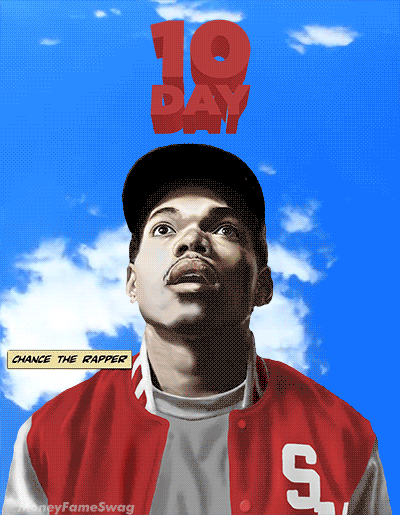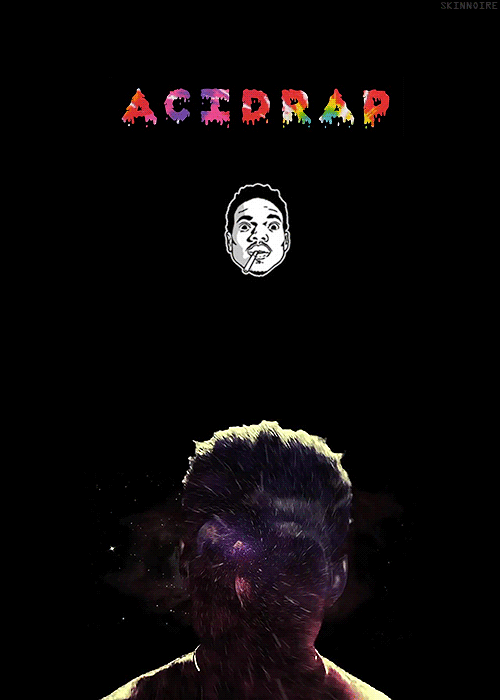Don't wanna be here? Send us removal request.
Text
Chance the Rapper’s rise to prominence like many aspiring rappers has been undeniably rocky and tough. In fact, he compiled his first mixtape, 10 Day, during high school when he was suspended. But it was this seemingly faltering path that would serve to cement Chance’s name in the legacy of rap music. Personally, I believe Chance’s music adds a new dimension to rap beyond the glorified commodities of sex, wealth, and/or violence. Chance’s conversational tone and eclectic musical influences coupled with his social commentary presents a more popular and recognizable exploration of his environment. This unique but simple style makes his music popular and widely-renowned; a familiar subject and range of musical techniques engages and connects the audience to him and his message. To understand his messages and stylistic tools that enhance his popularity and music, I will be exploring his three primary mixtapes: 10 Day, Acid Rap, and Coloring Book.


As mentioned previously, Chance recorded his first full-length project, 10 Day, while in detention for smoking weed. One song that jumps out at me from this mixtape is Nostalgia. As the title suggests, Chance raps about his childhood, nostalgic, infusing a sort of sentimental vibe that is reminiscent of Kanye West’s College Dropout. The beat, by itself, is quite simple but the addition of the flute and background music gives the song a more ‘50s feel, which in my opinion enables the song to connect to a wider array of the audience with its antiquated but refined touch. In addition, it helps, in terms of its popular appeal, too when its subject is something that all of us has experience at one point – reminiscence of childhood. An example of this fond remembrance can be seen in a pretty relatable few lines of the second verse,
I used to chill with the kids next door, And SpongeBob came around 'bout four, And then I’d hang with Bart’s guys, Around the bend was Smart Guy.
Another song from 10 Day that hits home with me and probably with most listeners is Hey Ma. With Chance popularly known as the prodigy of Kanye West, there is no doubt that this song is reminiscent of Kanye’s Hey Mamma, a similar tribute to his mother. What makes these two songs so popular include the vocal backdrops, which add a nice diversion from the typical monotonous beat and flow, as well as varying instrumental sounds such as the trumpet, which help to encapsulate a wider array of musical sounds and influences. Most importantly, though, are the songs’ messages that have a universal appeal – an unmistakable appreciation for mothers. Quite clearly can this gratitude be seen in the hook of the song,
I wanna scream so loud for you, cause I'm so proud of you Let me tell you what I'm about to do, (Hey Mama) You know I love you so I never let you go Wrote this song just so you know Nowhere you go our love is true.
I think Missing You from the same mixtape really propels Chance’s reputation as a rapper with a social activist agenda; an agenda that has gained traction and notice from members of society as influential as former President Barack Obama. On account of such recognition, Chance has seen has popularity surge recently as such issues have become the forefront of media and political agenda. Specifically, in the song, Chance talks about his friend Rodney who was stabbed and killed right in front of him. The song continues to rap about violence in Chicago. Coupled with the dark and menacing beat, the lyrics which delve into the sentimental and personal effects of such violence create a haunting message that brushes the emotional core of listeners. This is appropriately described in the first verse quite passionately by Chance,
Brown boys are dying, and none of ‘em were for business And all of em' love they mommas, and all of they mommas miss 'em And this shit is just stupid, this shit is fucking senseless The news shouldn't support it, this shit is getting expensive

Despite 10 Day being Chance’s first mixtape, it was actually Chance’s second mixtape, Acid Rap, that propelled him to stardom and gave him nation-wide recognition. This mixtape really strengthens Chance’s ability to utilize a wide-ranging musical repertoire to popular effect. In addition, this mixtape solidifies Chance’s presence in the national discussion of inner city violence but also gives him the platform to express positivity and hope about the future of the situation and the city of Chicago (Barnes). Something interesting to note is that, according to Chance, he was on acid for about 30 percent of his songs. Being under the influence of such a drug allows for limitless introspection – something that Chance utilizes to full effect successfully.
A great example of his ingenuity and creativity as an artist can be seen in Acid Rain from Acid Rap, which is personally one of my favorite songs and arguably one of the most heartfelt songs of the mixtape. In the song, Chance reflects upon the violence in Chicago by drawing on shootings that have resulted in the deaths of many children. Quite honestly, the lyrics are quite heartbreaking which help to fracture the barrier between him and the audience; lyrics that describe something so devastating elicit a sympathetic response that unifies peoples against injustices. Chance expounds upon these injustices by invoking specific instances of the children of Chicago killed from gun violence. For example, in the main verse, Chance mocks the online onlookers (i.e. the general public),
Funerals for little girls, is that appealing to you? From your cubicle desktop, what a beautiful view
He continues to talk about basketball players who had a future but tragically had that taken away from them as a result of gang violence,
For future hoopers dead from Rugers Shooting through the empty alley Could've threw him an alley-oop Helping him do good in school
One particular being within the song that shadows over Chance throughout the entire mixtape is his friend Rodney Kyles, who is described in the song quite hauntingly,
My big homie died young; just turned older than him I seen it happen, I seen it happen, I see it always He still be screaming, I see his demons in empty hallways
Despite the song only retaining a solemn, mellow beat – atypical of his other songs which have eclectic musical influences – it is the overall message, taking a stance against violence and crime, that is not only true to its time but also universally understood, which contribute to its popularity among individuals of society.
Another song from the mixtape that encapsulates the musical essence of Chance and is personally my second favorite of 10 Day is Cocoa Butter Kisses. The song, similar to Hey Mamma, is a tribute to his mother. Essentially, he is reminiscing on the days when he used to receive soft kisses from his mother that tasted like her cocoa butter cream. However, this is no longer the case because of his age and smoking/drug habits, which have caused his mother to avoid kissing him due to his “stank” and loss of innocence. What makes this song so musically profound is the structure and style of rapping of Vic Mensa and Twista, who are featured in the song. The layout of the two other rappers can be seen to represent the devolution of rap styles. Chance’s part is more conversational and a little choppy, which helps with the comprehension of his lyrics. Vic Mensa’s part has a little more flow and a little more up tempo. Twista’s part is a lot faster comparable to artists of yesteryears such as Busta Rhymes but is till successfully incorporated into the song in that it still retains the overall rhythm and flows well with the beat and the background music. Encompassing such different styles of rap adds to the appeal of the song, which enhances its popularity.

Chance’s third mixtape, Coloring Book, is personally my favorite mixtape. The mixtape enters a level of its own with its deeply personal lyrics as well diversified musical sounds. One of my favorite songs from the album is All Night featuring Knox Fortune. What really sets this song apart from the others is its unique style that is reminiscent of the Chicago house style of the mid to late 1980s: the popping beat and electronic-esque sounds.
One song in the mixtape that is arguably one of its most profound is Blessings featuring Saba. The song is soulful and incorporates black gospel in the background. This song explores Chance’s relationship with God quite artistically by touching on the Black Lives Matter Movement and the birth of his daughter. His allusion to the Black Lives Matter Movement can be seen in the following lines,
Jesus' black life ain't matter, I know I talked to his daddy Said you the man of the house now, look out for your family … His appreciation for him being blessed with a daughter can be seen here, I know the difference in blessings and worldly possessions Like my ex girl getting pregnant And her becoming my everything
Once again, Chance blows us away with his orchestration of sounds that entail Black culture while embedding his political and social beliefs on issues that pertain to Black lives. As Starr and Waterman describe when discussing about the advent of rock and roll music, “styles that had previously remained on the margins of pop music from a marketing standpoint now began to infiltrate and eventually to dominate the center completely”. Chance has taken grasp of the peripheral musical styles that have become antiquated and has it used to great effect; examples include classic soul, juke, gospel, blues-rock, drill, acid jazz, house (Starr and Waterman). For this case, Chance has revitalized gospel and soul music successfully. This gives him so much wider a platform to appeal popularly with which he can utilize for change.
Overall, it is Chance’s diversification of musical sounds and reflections upon life that make him truly a great rapper. Be it rapping about his mother or childhood or even national movements or shifts, Chance does it so artfully and effectively; this is what makes him such a popular artist and rightfully so.
Works Cited
Barnes, Tom. "How Chance the Rapper Went From High School Fuckup to One of Chicago's Elite Artists." Mic. Mic Network Inc., 29 Dec. 2015. Web. 10 Feb. 2017.
0 notes